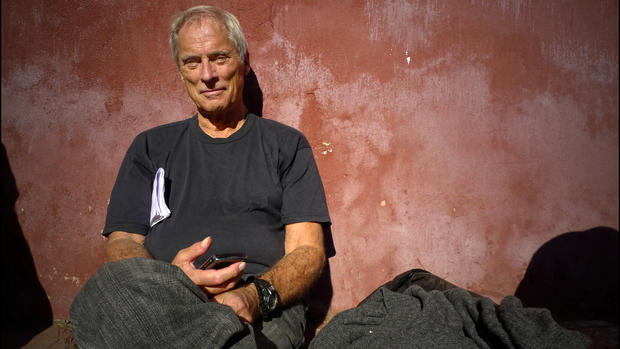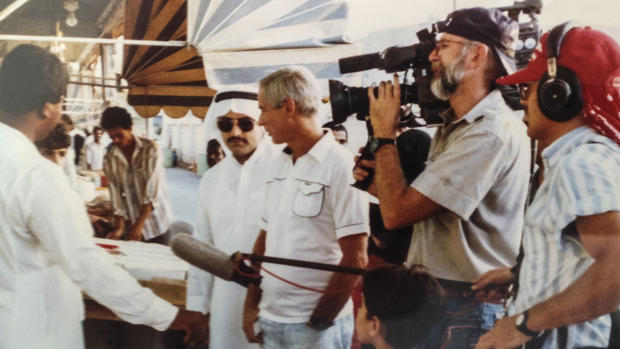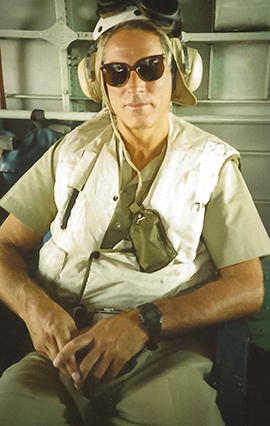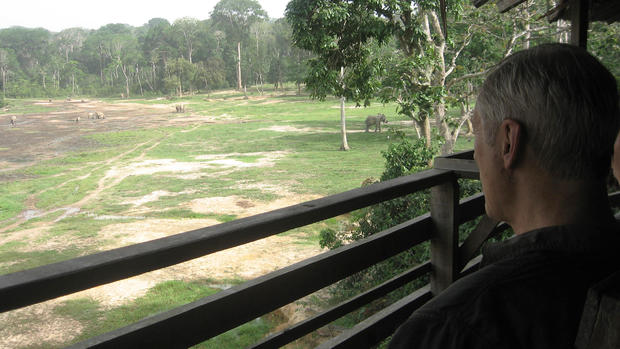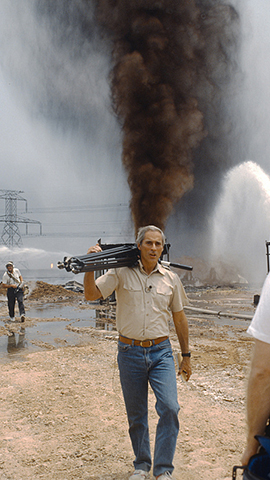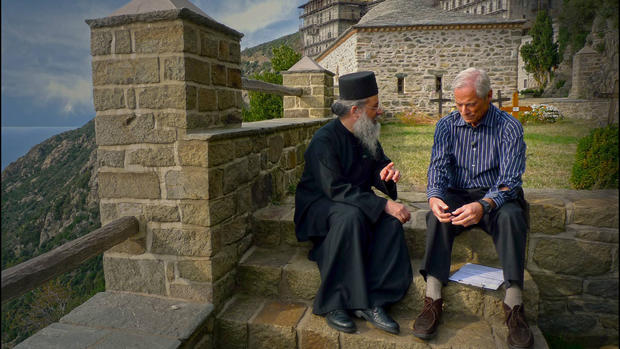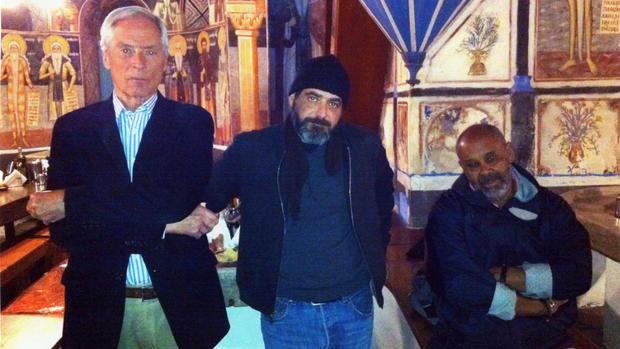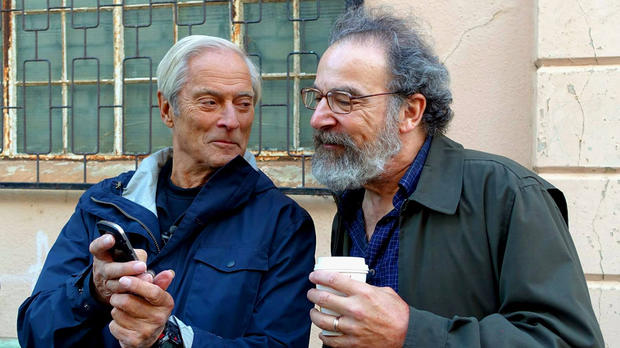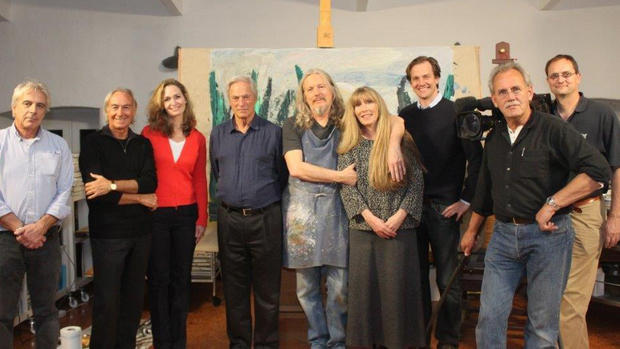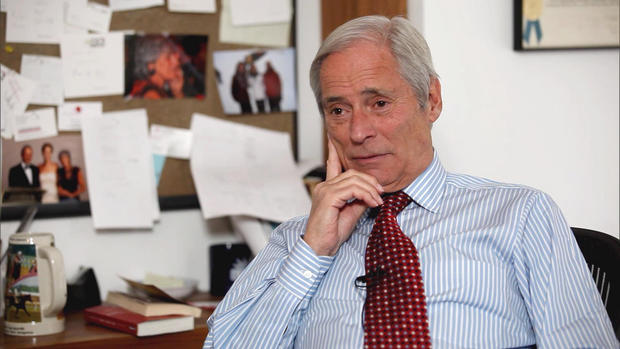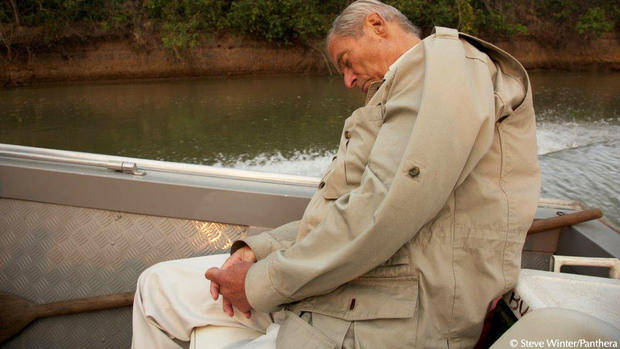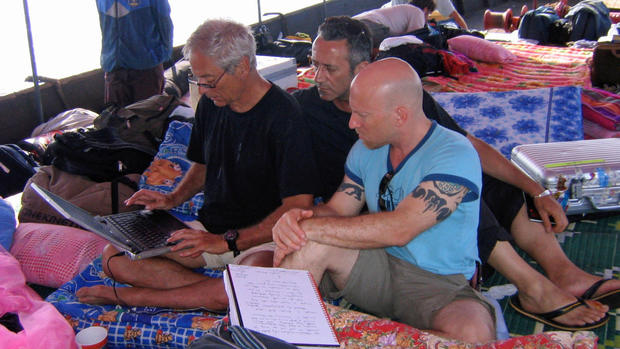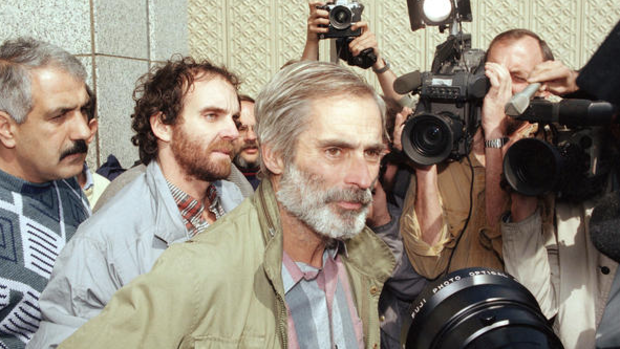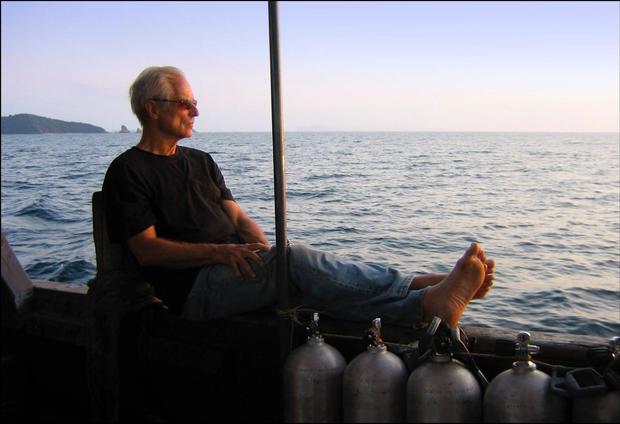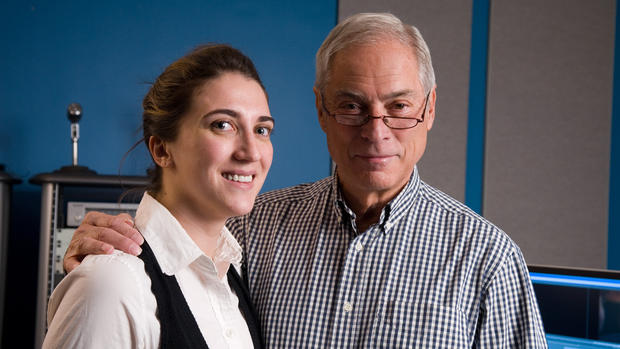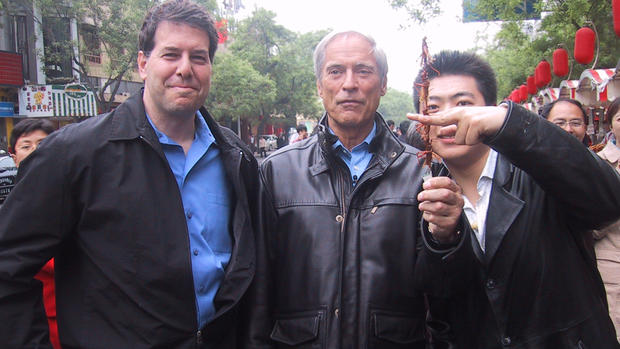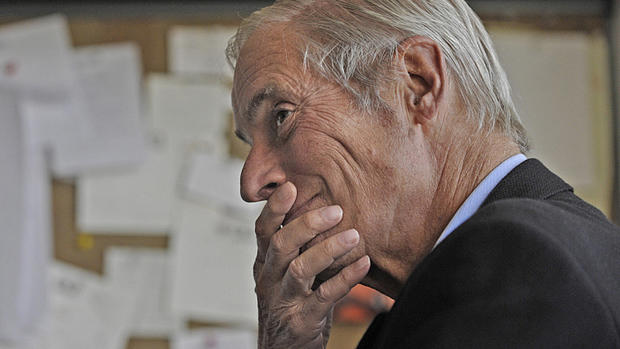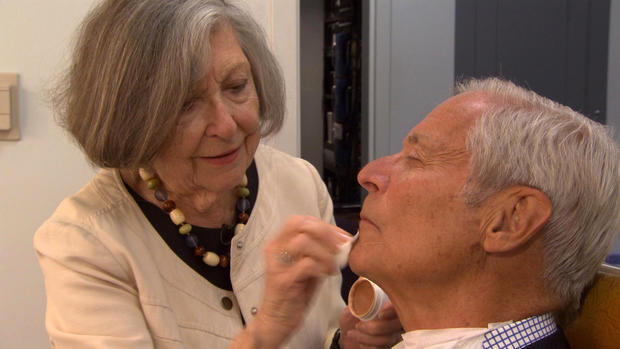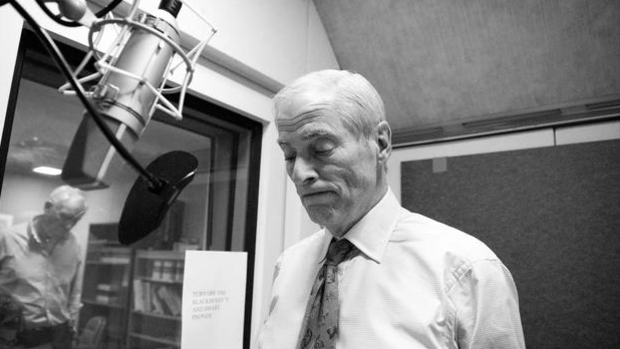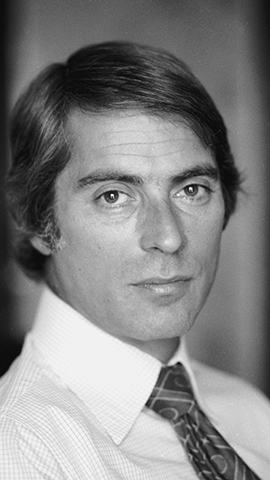Our stories about Bob Simon
"Nothing fazed Bob Simon. In December 2012, we were in Israel about to interview Ehud Barak, who was then the Israeli Defense Minister, when Barak asked Bob why we needed so much time to do the interview. Why not just 10 minutes? After all, we were only going to use a little bit of it on the air anyway, and Barak was in a hurry. I started to get nervous, but Bob just sat there very calmly studying his papers.
'"I'll tell you what,' I remember Bob telling Barak, 'I'll ask you the questions, and you get up whenever you want and leave.'
"'But Bob,' I remember Barak saying, 'I can't do that. If I do that, you'll film me walking out of the room and show it on 60 Minutes, and I'll look stupid.'
"Bob just shrugged. And of course Barak stayed and answered all of Bob's questions."
Andy Court, Producer, 60 Minutes
"In August 1990, Iraq invaded Kuwait, and within days, the U.S. launched Operation Desert Shield.
"After a few weeks, Saudi Arabia let a limited number of American journalists enter to cover what would be a massive U.S. military buildup. CBS News got only four visas. On our charter jet: Bob Simon, producer Mike Rosenbaum, soundman Paul Sedia, and me. I had been hired at CBS News only four months before and was beyond thrilled. Bob Simon was allowing me to go shoot for him!
"We landed late in the afternoon, and soon we were out on the flight-line at Dhahran Airfield, watching through the night as C-5 Galaxy military transports offloaded what would eventually be tens of thousands of tons of equipment and thousands of U.S. troops. Bob turned to me and said, 'I love this s**t!'
"I was extraordinarily impressed with Bob Simon -- the intensity of his focus, the breadth of his vision, and the extreme clarity of his description and interpretation of what was happening.
"For weeks, we made air on the CBS Evening News every night, and that was when I discovered a key to his brilliant writing. Bob Simon screened not only the talking heads to find sound bites. He also screened every single frame that was shot. All that information, filtered through his years of experience and prodigious powers of description, were there to see and hear in his pieces.
"I've shot a lot of stories in the 25 years since then, but I'll never forget that late summer of 1990, when for several weeks, this CBS newbie got to work with Bob Simon every single day."
Tom Rapier, Cameraman, CBS News
"One might think that with all Bob Simon had seen, he might have become jaded. But because he never was, I never could be. He didn't whisk in and rush off to the next assignment. Bob just enjoyed taking in a moment -- and the moment could be a long one -- like this one I was able to capture in Africa in 2009 during one of the trips we took together on assignment for 60 Minutes.
"There's Bob observing forest elephants grazing in a clearing. He just stared and stared at them."
Magalie Laguerre-Wilkinson, Associate Producer, 60 Minutes
"A few years ago, I went with Bob Simon to the premiere of HBO's 'The Newsroom' in New York. The invitations featured a large photograph of the actor Jeff Daniels, who plays the anchorman in the series. The same picture was hanging up on easels set up all over the pre-screening party. We all mingled, drinking and eating, chatting with the selectively invited media luminaries before settling in to watch the show. Jeff Daniels spotted Bob and came right over, politely waiting for Bob to finish a conversation before introducing himself. He told Bob he was a huge admirer of his work, and that he'd inspired him in his performance. Bob smiled, said 'Thank you,' and turned back to gossiping, probably about the blowhards and hypocrites that populate the television news business. Jeff Daniels stood there, interested, but Bob took no notice of him and kept right on talking. My wife Bonnie tried unsuccessfully to direct Bob's glance to one of the posters behind us. Finally the actor was surrounded and peeled away from our circle. 'Bob,' I said, 'Why'd you blow him off?' 'Blow who off?' he said."
Graham Messick, Producer, 60 Minutes
"It's rare that a journalist stumbles into an opportunity to take people someplace out of this world. Mt. Athos -- a long, narrow, ruggedly beautiful peninsula in Northern Greece -- is such a place.
"In the winter of 2010, I went there to film a 60 Minutes story with Bob Simon and Harry Radliffe, two legendary CBS News reporters. It doesn't get much better than that. Mt. Athos wasn't a hard news story; it was an opportunity to create one of those memorable 60 Minutes pieces, the kind of story where, years later, people say, 'Oh yeah, I remember that one. Loved that story about the monks with Bob Simon.'
"So we went, all of us. It wasn't easy- we wrote nearly 60 letters to the abbots and then took several planes, a few taxis, two boats and employed a few stevedores to get our team situated on the Holy Mountain. We filmed for two weeks in four breathtakingly beautiful holy monasteries, all of this time with Bob. I learned a lot from him, and I think he respected the work we put in to get him there and get it done. It was after our time there I was able to call Bob a friend. I will miss him."
Michael Karzis, Producer, 60 Minutes
"As a 60 Minutes editor, I've had the pleasure of cutting a number of Bob Simon's stories, including a recent profile of actor Mandy Patinkin. I remember how much fun we all had putting it together. It was an outstanding and memorable work experience.
"For starters, Bob's rapport with Mandy was immediate. They were both Jewish, talented, insightful, and funny men who'd had personal struggles in their pasts. They just couldn't stop talking, which meant an abundance of material that had to be whittled down. Bob became attached to many exchanges, especially this one because it made him laugh every time he heard it:
PATINKIN: ... the world is a mess . . . it's just such a nightmare.
SIMON: This is a really simple question. What turned the world into a nightmare?
PATINKIN: A guy named Elliot. Elliot Ginsberg did it on the 3rd of September in the year 2. (LAUGH)
SIMON: That could be the best answer I've ever heard.
"Because of time constraints, Bob reluctantly agreed to take it out, and even without it, the Patinkin profile was another glorious and classic 60 Minutes story.
"Bob and I hadn't worked together since December, but we'd often talk. The last time I saw him, just before he died, we were walking towards each other in the hallway, both busy. He winked at me. And I laughed.
"I couldn't wait to work with him again."
Stephanie Palewski, Editor, 60 Minutes
"Bob was a mentor and friend to me and I will miss him enormously. We always had a lot of fun and laughs doing stories together. Last year, we traveled all over Europe together, shooting stories in Geneva, Lyon, Antwerp, Cologne and Montenegro. We were always looking for a new adventure.
"Bob was great company and he had a lot of talents -- and one of them was his incisive humor. He loved comedians -- and he was a born comedian himself. He was continually trying out jokes on people. He sent me many funny emails too -- including these:
"When I told him I was heading out to pick up a new housekeeper:
Good luck with your Polish au pair. Hide the vodka.
"When I told him we had approval to do a story on the rare minerals boom in Greenland:
Great. Sandre Stumfyord is my favorite airport. Bring skates.
"When I told him we had the green light to do a story about African dictators who loot their countries' bank accounts and hide the cash in the U.S:
My one condition, when we land in E. Guinea, I want to get off the plane first so I can take a picture of your face when you see what you're in for.
"We were scheduled to start our next story in a couple of weeks and we were both looking forward to it. I feel lucky we had a chance to work together - and just wish there had been time for more adventures."
Katherine Davis, Producer, 60 Minutes
"Bob Simon really liked children. Well, most of them. Bob never talked down to them -- he engaged them as he would any adult. A couple of years back, I brought my son, William, and my daughter, Beatriz, into work. I told them to sit tight in my office and walked to the edit rooms to check on some of the stories we were working on. About 10 minutes later, I returned to find Bob sitting on my couch talking to them both. They were probably 9 and 8 years old at the time and engaged in what looked like a pretty heavy discussion.
"Bob Simon really liked children. Well, most of them. Bob never talked down to them-- he engaged them as he would any adult."
"As I entered my office, the conversation didn't stop. Bob didn't even acknowledge me. I remember Bob had his hand up over his mouth listening intently to them, asking them questions about a whole range of things. Sort of an interview. I listened and then interrupted my son to correct something he was saying. Bob put his hand up to me, as in 'Stop it!' and he said very seriously, 'We are having a perfectly interesting conversation here. William definitely doesn't need your help. Beatriz either. Why don't you leave us alone and go back to wherever you were before.' My kids wanted me to share this story. I am happy we have it."
Bill Owens, Executive Editor, 60 Minutes
"You know that my friend Bob was a deservedly celebrated foreign correspondent before he became one of the central pillars of 60 Minutes. What you may not know is that Bob had an uncanny ability to fall asleep anywhere, not only on trans-Atlantic flights, but in SUVs, Army Humvees in Iraq and even in open-air boats in exhilarating locations.
"A few years ago, we were in a remote part of Brazil called the Pantanal to document the efforts of a group named Panthera to save jaguars. We were a bit nervous that we would not see even one of the elusive cats, and Bob, who could be shall we say impatient, started complaining to our host when we did not find a jaguar in the first minutes of our first cruise down the river.
"Once Bob vented, however, he felt comfortable taking a snooze as we kept cruising. We were a little concerned that Bob might actually fall out of the boat into the river, which was infested with piranha. But since Bob had survived catnaps in war zones, we figured he could survive the Pantanal piranha.
"After Bob woke up, we started seeing more jaguars than we ever thought possible, and we put together a story we called 'In Search of the Jaguar.'"
Tom Anderson, Producer, 60 Minutes
"Bob Simon was the most human human I've ever met. He was hungry for life in all its riches, glory and sadness. Though he lived out of a suitcase, he made a point to read the best literature, hunt down the most interesting restaurants, and take in opera whenever he could.
"Bob Simon was the most human human I've ever met. He was hungry for life in all its riches, glory and sadness."
"During the six years I worked on Bob's team, he taught me that irony should be at the heart of most every story, and that storytelling always trumps the bland imparting of neutral information.
"Humor was also central to the way Bob thought and operated. If he hadn't been a globetrotting TV reporter, Bob would have been a great Borscht-Belt comic.
"Alongside humor, Bob had poetry. In 2005, after the murderous Indian Ocean tsunami, we profiled a group of Sea Gypsies, called the Moken, who survived the disaster because they knew it was coming. Our transport--and hotel--was an old Burmese fishing boat, which we sailed from Thailand to Myanmar.
"The further we went, away from the familiar and into the Moken's world, the more transported Bob became. These people lived what seemed to us to be a simple, non-materialistic life, and Bob kept saying wistfully that they must be among last such people left on earth.
"Bob had access to his feelings in a way few people do. And he was unafraid to share them--with his colleagues, friends and the millions of viewers who watched his stories. He poured himself unstintingly into his work and his life. This is what I'll miss most about him."
Solly Granatstein, Former 60 Minutes Producer
"In December 1992, Bob Simon and I went aboard a Navy ship off the coast of Somalia as part of the CBS News team that landed with U.S. Marines on the beaches of Mogadishu. The ship's captain asked Bob if he would go on their in-house television station to discuss his career and coverage of the military intervention in Somalia. This invitation came not just because Bob was a well-known foreign correspondent. His capture by Iraqis gave him unique status with the Marines and sailors. In their eyes, Bob had been a POW, and that earned him their respect. There was a special reverence in the way they approached him and talked to him about it, thanking him for what he had endured. That happened again and again during the six weeks we spent in Somalia. Although he was a civilian and a reporter, the troops seemed to feel he had suffered at the hands of the enemy and they told him how much they admired the way he carried himself through that ordeal.
"Back in 1991, when Bob was captured, I was the Amman bureau chief. Bob's wife, Francoise, spent a good deal of time there during his captivity, working every angle to try to secure his release. Her fortitude and grace in that time is something that has never left me. I worked some of the logistics-- transportation, food, etc.- for the night Bob and his team were released. Being there as they came across the border into freedom is also something I will never forget. A little over a year later, Bob and I got to work together again, covering the winter Olympics in France. I learned something very important when I saw he kept a pair of skis in his car. When there was a break covering the games, Bob was off on the slopes. It was how he lived, working and playing."
Mary Walsh, Producer, CBS News
"What a phenomenal writer Bob was. Picture Sarajevo, 1992. We were among the first teams arriving in the city, flying in on a military Hercules C130. One member of the CBS crew got in a couple of days before us, so he picked us up from the airport and drove us through 'sniper's alley' to the Holiday Inn in the center of Sarajevo.
"We started filming almost immediately. In the city square, there was a bakery where people usually would queue for bread. A mortar exploded right there and killed 22 people.
"That night Bob wrote the script....and after he finished he called us to have a look. At the end, we all had tears coming down our cheeks."
"The next day, while walking through that square we came across a man with a beard who introduced himself as a cello player from the Sarajevo Philharmonic Orchestra. He said he would start playing his cello the next morning, at precisely the time the people died two days earlier, and he would play there every day for 22 days.
"We went to the square the following day, and there he was, ready to play, dressed in black tie and flanked by five men with AK-47 machine guns. Then he started playing Adagio in G Minor by Tomaso Albinoni. The sound was echoing between the buildings while the Serbs were shelling the town. A sad piece of music, even sadder because of the circumstances. That night Bob wrote the script, Josh Mason edited the piece, and after he finished he called us to have a look. At the end, we all had tears coming down our cheeks. Arguably one of the best news pieces ever produced without a producer in sight. Nota bene."
Wim de Vos, Cameraman, 60 Minutes
"I was one of the editors assigned to work with Bob in 1990 when Nelson Mandela was released from prison after 27 years. Speed was a necessity here, and our story would lead the evening news.
"The day was extraordinary. Mandela walked into the bright warm Cape sunshine hand-in-hand with his wife, Winnie. Every conceivable broadcaster and journalist from all over the world was there. We had camera crews posted everywhere: riding backwards on a motorcycle filming Nelson drive into Cape Town, covering the demonstrators clashing with police, climbing the walls of city hall to record Mandela talking to the crowds. It was the first time South Africans had ever heard him speak. Our crews captured the magic unfolding all around, an editor's dream. We had this story covered and Bob would lead the evening news to tell the world about this historic moment.
"As Bob and his crew were leaving the scene, they were caught up in a skirmish between white South African police and black supporters of Mandela. The police opened fire with bird shot on the crowd, and despite the time pressure to file a story, Bob insisted on staying to witnessing what was happening.
"Our team got a late start on the edit, but Bob quickly got to work writing, and the first half of his story, edited by Tom Honeysett, was masterfully crafted. But the second half of the piece, the part that I was to stitch together, was about to hit a wall.
"There was still an hour before our broadcast, plenty of time to turn this last section into something that would knock the socks off the executives in NY. Bob wrote the first two paragraphs and then: It was ice cream time. Bob's eyes lit up when ice cream was around, and he couldn't resist an ice cream break.
"We now had 15 minutes to air. 'Still okay,' I thought. I could still make this. No editor had ever missed a slot in a broadcast working with Bob, so Bob didn't panic. I was a little concerned but producer Michael Gavshon was losing color fast.
"The first section was already fed into the show, waiting to roll. I was still furiously editing as the show began on the hour, and I remember hearing a voice through the intercom. It was executive producer Linda Mason, cool as a cucumber: 'We won't lead with the Simon/Mandela piece.' We had finally run out of time."
Paul Bellinger, Editor, 60 Minutes
"Flipping through Bob's passport when I was his broadcast associate in 2007, I saw firsthand a man whose life had no borders. And for someone like myself -- who hadn't really traveled outside of the occasional trip to Europe -- working for him was like a 101 in breaking open the world to understand it more fully.
"I relied on Bob to guide me through my unfolding path as a budding journalist and it didn't matter where he was in the world -- on a story in Cairo or on an epic motorcycle journey in Maine -- he took time from whatever he was doing to dispense advice with the right amount of humor and care.
"If the question was whether to go or play it safe, Bob's answer was always: Go."
"When the boss at my new job wanted to send me to Afghanistan to cover a news story, I immediately emailed Bob for advice. At the time, I had a broken ankle and required crutches to walk. Traveling anywhere, let alone Afghanistan, made me very nervous. Bob responded right away in the only way he could -- cool and calm: 'Of course, you will go to Afghanistan. I would, which means you will, too. Crutches? Big deal. It might make the Taliban less likely to shoot you.'
"If the question was whether to go or play it safe, Bob's answer was always: Go."
Mandana Mofidi, Producer, VICE on HBO
"My sharpest recollection of Bob Simon has nothing to do with his war reporting or bravery. For me, what comes to mind is dumplings. Fried Chinese dumplings.
"I was fortunate to produce a couple of stories for Bob at 60 Minutes a decade ago. One of them was a profile of the pianist Lang Lang that took us to his home country of China. The story was a natural for Bob, who was steeped in classical music and had profiled some of the world's greatest conductors and composers. But Bob had his priorities straight and saw our profile of Lang Lang as a means to a greater end: the pursuit of the best Chinese meal he could find.
"Each morning as we gathered in the hotel lobby, Bob would start the conversation the same way:
"'Where are we eating tonight?' It wasn't a casual question. He was intent on making every opportunity count.
"During a week and a half of shooting, Bob lost his cool exactly once, and for good reason. We screwed up dinner. After a full day running around Beijing we bungled the reservation and wound up having to eat a forgettable meal in the hotel.
"Our culinary high point came on the final day of shooting as we followed Lang Lang on a visit to his relatives in a small suburban apartment. There, his mother and aunt emerged, almost comically, from an impossibly tiny kitchen with several heaping platters of home cooked dumplings: pork dumplings, beef dumplings, shrimp dumplings. The camera rolled as Bob indulged in the feast with Lang Lang's extended family, capturing on tape the most authentic and delicious meal of our trip.
"He was not only a giant in our business but a warmhearted man. After I left 60 Minutes I ran into Bob a few times, and we always spoke of those dumplings."
Mitch Weitzner, Senior Executive Producer of Long Form Programming, CNBC
"I never shot a piece with Bob. He often seemed to just appear on the couch in my office. No introductory words wasted. He'd just bring up a topic. We talked about family or friends or occasionally a turn of phrase he wanted to make. We talked about theology when he was doing his stories about Christians in the Holy Land and the Ecumenical Patriarch and the Copts of Egypt. He once wrote from a shoot in New Zealand, asking about the literary meanings of the color black. We talked as colleagues about colleagues. Sometimes he just had an unrepeatable joke to tell.
"[Bob] was the kind of person you could be completely free with -- an unusual quality in a correspondent/producer relationship."
"He was the kind of person you could be completely free with -- an unusual quality in a correspondent/producer relationship. When he was satisfied with the conversation, he'd disappear as suddenly as he appeared. He'd just wander out.
"Now he's wandered out again."
Frank Devine, Senior Producer, 60 Minutes
"Millions have seen the award-winning war correspondent Bob Simon on television. I got to see Bob Simon, the man, up close in the makeup room and in the studio, being scrutinized under the microscope of the high-definition camera. 'Should his jacket be buttoned? One button or two? Or unbuttoned?' Oops, his wristwatch is catching the light -- off it comes, unceremoniously tossed in the air to Tony Mirante, the stage manager. All the while, Bob is telling jokes, sometimes bawdy but stylishly delivered.
"He was fiercely just, and had little patience and a steely-eyed few choice words for unprofessional work. He had a kind and generous heart, like the time on an outdoor shoot in New York when he arranged a lunch break so that I could attend a memorial Mass on the anniversary of my husband's death. Here was this lovely Jewish man, calling lunch for the entire crew, so that I could get to the Mass. It was so thoughtful.
"I was witness to the misty, joyful eyes at the birth of his grandson and privileged to share the joy and pride of an adoring grandfather."
Riccie Johnson, Makeup Artist, 60 Minutes
"I started out at 60 Minutes as Bob's first assistant. When he hired me, Bob said he didn't think he needed an assistant, but CBS News was insisting he get one to do his expenses. I assured him I would make myself indispensable.
"After a few weeks of making his coffee and trying to make sense of his receipts, Bob gave me my first real assignment. He asked me to fact-check a speech he was preparing to give at the University of Michigan.
"The invitation had come from the University's Greek Society and Bob wanted to tailor the content of his speech to his audience. So he wrote a fascinating first-hand account of the conflict in Cyprus.
"We worked together for 12 years. I'll miss his sense of humor most of all."
"I double-checked names and dates and printed a copy for him to take to Ann Arbor. Neither one of us realized that Greek Society in this case meant a bunch of frat boys who couldn't care less about the Archbishop Makarios.
"Bob traveled so extensively, spent so much time overseas that certain facts of life in America occasionally eluded him. After he gave the speech, Bob called me on his office line, laughing about how he had put his audience to sleep. We worked together for 12 years. I'll miss his sense of humor most of all."
Nathalie Sommer, Producer, 60 Minutes Sports
"Once, back in 1997, I had the opportunity to work with Bob Simon and his 60 Minutes team on a story about post-Soviet Azerbaijan. As the 'fixer,' my job was to help prepare the team in the field. At a certain point, I starting getting testy whenever I thought Bob was not paying sufficient attention to all the (often useless) detail I was providing. Around day three, Bob's producer, Michael Gavshon, took me aside and read me the riot act.
"'Maybe you just don't get it,' I remember him snarling. 'Bob is here -- has been here almost a week, working on this story whether he always looks like it or not. He is the consummate pro in this end of the television business.' Other correspondents might have wanted us to set up all the interviews in a single day and fly out the next day -- or maybe the same night. 'Get it?' Gavshon said. 'Now, shape up or we'll find us another fixer!'
"I guess I shaped up because I was allowed the privilege of continuing to work with Bob and his team, who ended up producing a balanced and nuanced television piece on the complex piece of real-estate called Azerbaijan, and I am proud as punch to this day that I was part of it."
Thomas Goltz, Montana-based writer and filmmaker
"In the studio, Bob would always be calm and professional -- and often funny. He was especially fond of Borscht-Belt jokes and wouldn't sit in the chair until he got a laugh."
Tim Patryk, Former 60 Minutes Cameraman, Studio 33
"No correspondent seemed to enjoy their time in Studio 33 more than Bob Simon. He did shtick -- telling jokes, tossing his cheap watch. He kibitzed in the control room, talking with anyone and everyone, always without airs. He was completely approachable. Bob sometimes stayed and joined the crew for lunch.
"After reading the book 'Unbroken,' which became a movie, I mentioned to him that his Louis Zamperini piece had done all the leg work for the author. He looked at me, half-smiled and dryly said, 'Not a dime in it for me.'
"He kibitzed in the control room, talking with anyone and everyone, always without airs. He was completely approachable."
"Bob wasn't relaxed working with us because he found the studio work easy. He often required multiple takes. Yet, when frustrated he was only hard on himself. He never took it out on anyone else. Bob was a 33 crew favorite. After learning the sad news many of us were compelled to share our feelings, and praise for Bob. That doesn't happen a lot. It's another indication of Bob's positive force."
Glenn Sundel, Technical Supervisor & Video, Studio 33
"I first met Bob Simon in 1983 at the Cable and Wireless offices in Barbados. I was a pup producer only a few months into my CBS career; Bob was a top-notch correspondent and already a near-legend at the network. We'd both been sent to cover the U.S. invasion of Grenada but Barbados was as close as we could get at the time, and Cable and Wireless was the only place from which we could feed our stories. I was in over my head, both editorially and logistically, and just doing my best not to screw things up. Bob was a seasoned war correspondent, and it must have given him pause to find me as the person nominally in charge of the CBS News operation. If it did, he never let on. He treated me with grace and generosity, simply noting with a smile that I looked so young that I ought to be in high school. For me, watching Bob was like being in a master-class of television storytelling. I saw him blend words with pictures beautifully, under extreme deadline pressure, and that experience has been a model for me ever since. Bob remained a hero to me for more than 30 years, and for all that time, he never called me anything but 'kid.'"
Rome Hartman, Producer, 60 Minutes Sports
"I worked with Bob on a number of his 60 Minutes stories in Israel, and over time came to see him as a true Jewish patriot -- fully reserving his right to criticize a country that meant a great deal to him. Bob was taken by the friendships and relationships he built with Israel's heroic fighters. He enjoyed their company, perhaps their machoism, and, I felt, the cause that drove them.
"I recall working on 'Terror Behind Bars' with Bob, a story that took us to some of Israel's most secure prisons. Bob met some high-level terrorists, and I recall how he challenged them. 'I want to know what really crossed your mind when you knifed the old man and the four women at the bus stop?' I recall Bob asking one man. The man said: 'I saw a black sign with the words 'revenge.'' Bob said: "Stop. I want to know what really crossed your mind.'
"At another prison, I recall Bob being stopped by a jail officer who said -- as so many in Israelis did everywhere Bob went -- 'You are Bob Simon!' and began telling him his own story.
"Bob was one of a kind. After Gilad Shalit was released, Bob came specially to meet with his father Noam, driven by his own memories of having been captive in Iraq during the Gulf War.
"Please convey my sincere condolences from Jerusalem to Bob's family, friends, and colleagues."
Israel Goldvicht, journalist
